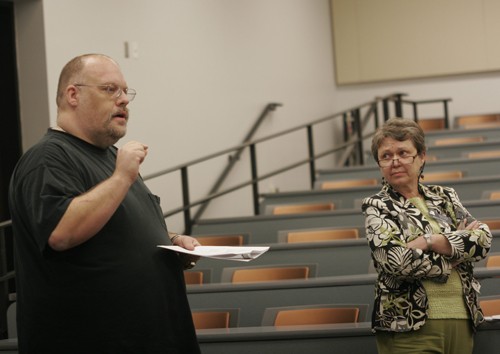The body of faculty members and administrators responsible for graduate academic policy formation, the Graduate Council, will meet today to discuss amending and possibly endorsing a graduate student bill of rights.
The bill, which outlines a series of rights and responsibilities for graduate students, is currently being developed by the Graduate and Professional Student Council. The GPSC is seeking input from policy bodies like the Graduate Council. The endorsement of the council, although not officially required to ratify the bill, is a necessary step before the bill can be presented to President Robert Shelton for final approval, GPSC leaders said.
“”They’re the people in a position to sort of whisper in administrators’ ears,”” GPSC President David Talenfeld, a second-year judicial sciences student, said of the Graduate Council.
The Graduate Council will meet at 3 p.m. in the Regents Room of the Administration building.
The council, which has not yet seen the most recent version of the bill, is supportive of the bill and will likely endorse it after some language is changed to match existing legal documents, said Dean of the Graduate College Andrew Comrie, who sits on the council.
“”I haven’t found a person who doesn’t think it’s a good idea,”” he said.
The main sticking point, Comrie said, is specific language of the bill that may not line up exactly with pre-existing legal policies. In addition, some faculty members on the council, although in favor of the spirit of the document, are unfamiliar with the details of the bill and will need to be educated about it by Talenfeld, he said.
“”It’s just a matter of what shape it will take,”” Comrie said.
The bill, previously passed by GPSC last September, was largely dropped after being edited by Associate Dean of the Graduate College Dianne Horgan due to miscommunications between administrators and GPSC, Comrie said.
This semester, Talenfeld has said ratification of the bill is a top priority for GPSC, which has formed a subcommittee to review amendments to the bill and prepare it for presentation to Shelton.
“”We’re going to pick up where everybody dropped the ball,”” Talenfeld said.
As of Thursday afternoon, Talenfeld had not completed revisions to the document necessary for presentation at today’s Graduate Council meeting but plans to do so before the meeting.
“”I’d like to give them a document that’s ready for their comments,”” he said.
Rapid endorsement of the bill is unlikely, Talenfeld said, adding that his presentation today will focus on the broad implications of the bill rather than any specific line items.
Chair of the Graduate Council and linguistics professor Andrew Carnie said in an email that he might be unable to attend today’s meeting due to illness but that endorsement of the bill “”really depends on what David (Talenfeld) brings us, (as) we haven’t see the revised version.””









